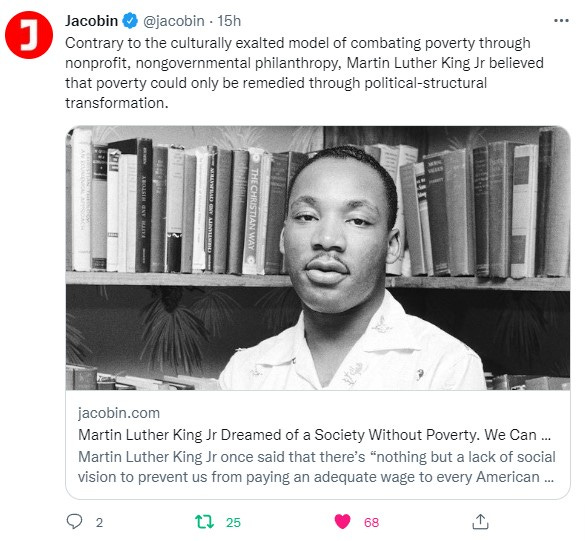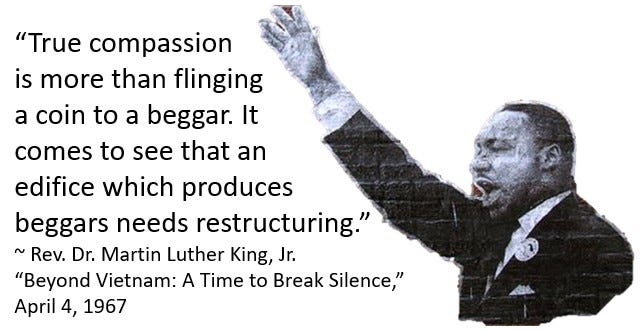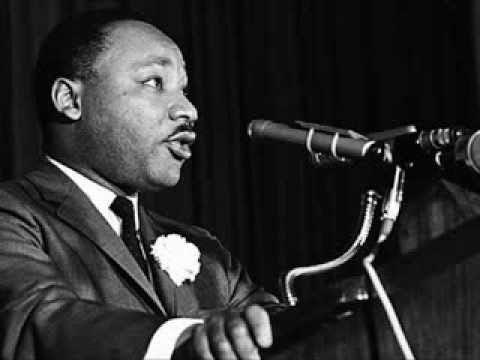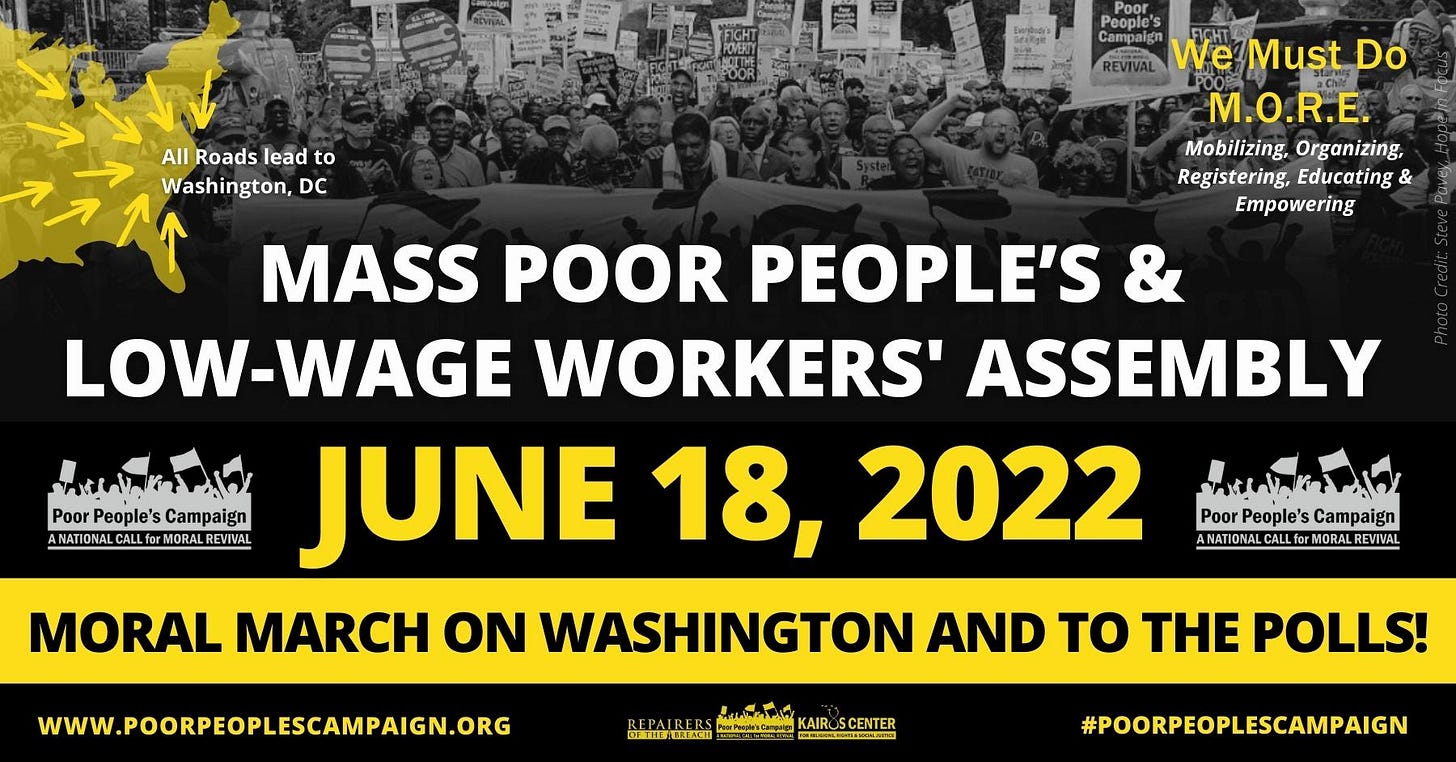Rev. King's Other Dream: Ending Economic Injustice
On May 31, 2022, Jacobin published my piece on Rev. Dr. Martin Luther King’s analysis of economic injustice. In the piece I note that most people know Rev. King for his leading role in combating racism. But too few know that he spent the last year of his life organizing a poor people’s march on Washington, D.C. that he hoped would rival the 1963 March on Washington where he delivered his famed “I Have a Dream” speech.

King believed racism was just one part of at least three interlocking injustices that included militarism and the extreme materialism of the prevailing economic system. By extreme materialism King meant the prioritization of things and financial gain over people. King argued that such injustices required social transformation and a “revolution of values,” not mere adjustment or reform. In his Riverside Church address, “Beyond Vietnam: A Time to Break Silence,” Rev. King contended

On June 18, 2022, the non-partisan group, Poor People’s Campaign: A National Call for Moral Revival will hold a poor people’s and low-wage workers’ assembly and march on Washington, DC. to advance Rev. King’s vision of an economically just society.
Below is an excerpt of the Jacobin essay followed by two video clips of my April 24, 2022 talk, “Economic Inequality: What Would Rev. King Do?” Lastly, you will find audio of Rev. King’s “Three Evils Speech of Society” of 1967.
Excerpt: “Martin Luther King Jr Dreamed of a Society Without Poverty. We Can Achieve It.”
In what would be the last months of his life, King joined fellow organizers in the Southern Christian Leadership Conference (SCLC) in planning a Poor People’s Campaign. The intent was to bring together two thousand poor people from all different ethnic-cultural walks of life to set up an encampment in Washington DC culminating in a new march on Washington, like the one in 1963 where he gave his famed “I Had a Dream” speech. The aim was to pressure leaders in the federal government to commit $12 billion to address systemic poverty.
During a 1967 planning meeting, King said, “I think it is necessary for us to realize that we have moved from the era of civil rights to the era of human rights.” King and SCLC intended to draw on their organizing knowledge and expertise in nonviolent civil disobedience to do for economic justice what their movement had achieved for civil rights with the passage of the Civil Rights Act of 1964 and the Voting Rights of 1965.
On April 3, 1968, King joined striking sanitation workers in Memphis, Tennessee. The following day, he was assassinated. He was murdered just two months before the Poor People’s March….
Contrary to the culturally exalted model of combating poverty through nonprofit, nongovernmental philanthropy, King believed that poverty could only be remedied through political-structural transformation. “The way to end poverty,” he said, “is to end the exploitation of the poor.” To this he added we could end poverty by also ensuring poor people have “a fair share of the government services and the nation’s resources.”
Attempting to solve the problem of poverty by exclusively teaching poor people how to “improve themselves” and better manage their financial resources is a bit like teaching black boys and men to navigate white supremacy by not wearing hoodies, or like trying to help women combat sexist harassment by encouraging them to dress more modestly. These kinds of suggestions fail to address the root of the problem and simply blame the victim. Ultimately, King believed, we will have to transform the economic structure itself….
On June 18, 2022, the nonpartisan Poor People’s Campaign: A National Call for Moral Revival will hold a poor people’s and low-wage workers’ assembly and march on Washington, DC. …the nonpartisan grassroots group’s aim is to advance the campaign launched by King and his allies in 1967, and to finally fulfill its aims….
The new Poor People’s Campaign demands immediate federal and state action to address the needs of millions of poor and low-income Americans. The group contends that the official poverty measure, which would not label a family of four earning $26,000 as poor, conceals the extent of the problem. By the official measure, about 12 percent of the US population is poor and another 18 percent near-poor. But other calculations of poverty that account for costs of essentials such as food, clothing, housing, and utilities, conclude that closer to 43 percent of the US population is poor or low-income.
Read the full piece to learn more about first Poor People’s March and King’s analysis of economic inequality: Martin Luther King Jr Dreamed of a Society Without Poverty. We Can Achieve It.
Economic Inequality: What Would Rev. King Do?
Excerpts from a talk delivered April 24, 2022 before the Unitarian Universalists of Tarpon Springs, Florida.
The first clip presents Rev. Dr. Martin Luther King, Jr.'s proposed solution to the problem of economic inequality, and places that solution in the context of 21st century economic inequality.
Rev. King contends that poverty was more the result of an unjust economic system rather than individual defect. From King's perspective, to blame the poor for their circumstances is to blame the victim.
If you found this post interesting, please share it with others and like it by clicking the heart icon. And be sure to subscribe if you haven’t already.
Invite Dr. Nall to Speak
Dr. Nall delivers energetic live presentations and engaging workshops on the subjects featured in Humanities in Revolt including Rev. King’s analysis of economic inequality. Those interested in booking a workshop or talk can get in touch through Facebook or by leaving a comment.

Primary Sources: Rev. King, “Three Evils of Society,” August 31, 1967
Listen to Rev. King’s “Three Evils of Society” speech, in his own words, delivered at the National Conference on New Politics August 31, 1967.
Subscribe
Subscribers will receive periodic posts pertaining to the broad domain of humanistic inquiry, from the insights of great thinkers throughout human history, the meaning and importance of critical thinking and ethics, the underappreciated poetry in everyday existence, to contemporary cultural analysis and the ongoing struggle to combat human oppression and violence. You will also have the opportunity to engage the author and our online community in dialogue about each post.
Why get a paid subscription?
Paid subscriptions directly support Dr. Jeffrey Nall’s efforts to produce and share publicly accessible independent scholarship and analysis. Supporting donations can also be made through PayPal. For more about my work go to JeffreyNall.com and find me on Twitter, Facebook, and Instagram.






